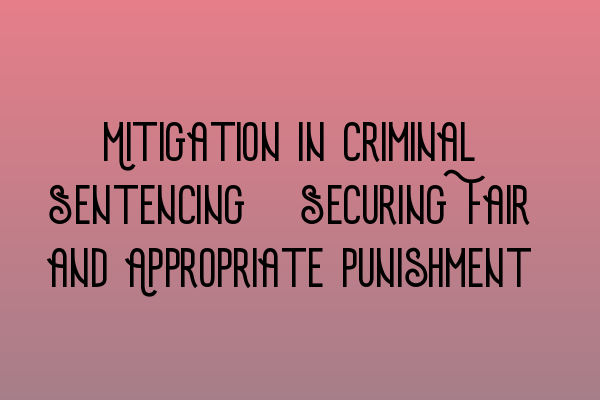Mitigation in Criminal Sentencing: Securing Fair and Appropriate Punishment
When it comes to criminal sentencing, a key aspect that both defendants and their legal representatives focus on is mitigation. Mitigation refers to the presentation of evidence and arguments aimed at reducing the severity of the sentence imposed by the court. It plays a crucial role in ensuring fair and appropriate punishment. In this article, we will explore the concept of mitigation in criminal sentencing and discuss its significance in the realm of criminal law in the UK.
The Purpose of Mitigation
The purpose of mitigation in criminal sentencing is to provide the court with information that may influence the decision about the appropriate punishment for the defendant. Mitigation recognizes that every case is unique and that there are often factors or circumstances surrounding the offense that may justify a less severe sentence.
Effective mitigation can help demonstrate remorse, provide explanations for the defendant’s actions, highlight any mitigating circumstances, and emphasize the potential for rehabilitation. It allows the court to consider a fuller picture of the defendant’s character and background, ultimately enabling the imposition of a fair sentence.
Types of Mitigation
There are various types of mitigation that can be used during the sentencing process:
- Personal Mitigation: This involves presenting evidence about the defendant’s personal circumstances, such as their background, education, family situation, and mental health, that may have contributed to their actions. It helps to create a comprehensive understanding of the person behind the offense.
- Remorse: Demonstrating genuine remorse and taking responsibility for the offense is a powerful form of mitigation. Expressing remorse can show the court that the defendant acknowledges the harm caused and is committed to making amends.
- Character References: Providing character references from individuals who can attest to the defendant’s good character, reputation, and positive contributions to society can positively influence the sentencing decision. These references can highlight the defendant’s positive traits and their potential for rehabilitation.
- Cooperation: If the defendant cooperates fully with the investigation and provides assistance to the authorities, this cooperation can also be seen as a form of mitigation. Cooperation demonstrates a willingness to rectify the situation and can potentially lead to a reduced sentence.
The Role of Legal Representatives
Legal representatives, such as solicitors, play a crucial role in effectively presenting mitigation on behalf of their clients. They gather relevant evidence, interview witnesses, compile character references, and construct persuasive arguments to secure a fair and appropriate sentence for their clients.
At SQE Criminal Law & Practice Law UK, our team of experienced and knowledgeable solicitors understands the importance of mitigation in criminal sentencing. We strive to provide top-notch legal representation, ensuring that our clients’ cases are presented in the most compelling manner possible.
Our solicitors work closely with clients to gather all necessary information, prepare strong mitigation materials, and deliver persuasive presentations in court. By leveraging our expertise, we aim to secure fair and just outcomes for our clients.
Conclusion
Mitigation in criminal sentencing is a critical process that aims to secure fair and appropriate punishment for defendants. It recognizes the unique circumstances surrounding each case and enables the court to consider all relevant factors before deciding on the sentence.
To enhance your understanding of criminal law and practice, take a look at our related articles:
- SQE 1 Practice Exam Questions
- SQE 1 Practice Mocks FLK1 FLK2
- SQE 2 Preparation Courses
- SQE 1 Preparation Courses
- SRA SQE Exam Dates
By familiarizing yourself with these resources, you can gain valuable insights into the SQE exams and effectively prepare for a career in criminal law.
